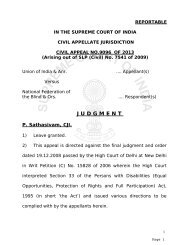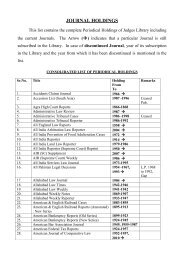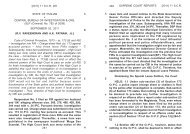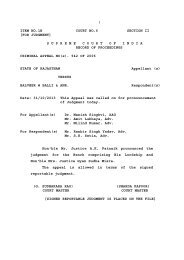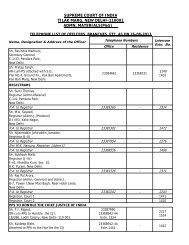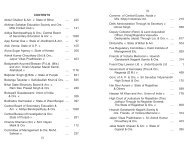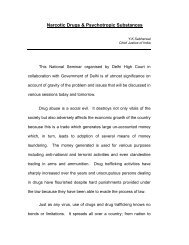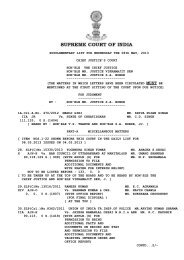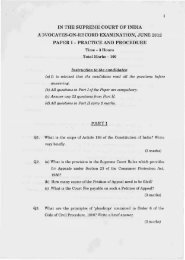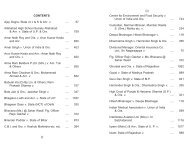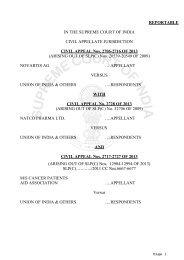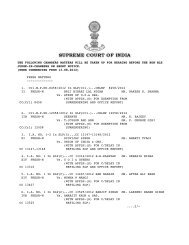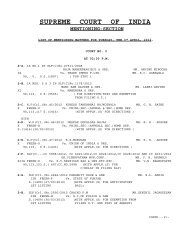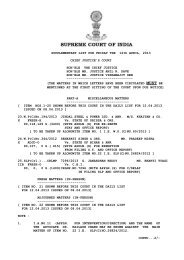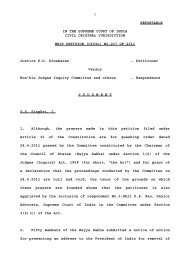Part No.IV - Supreme Court of India
Part No.IV - Supreme Court of India
Part No.IV - Supreme Court of India
You also want an ePaper? Increase the reach of your titles
YUMPU automatically turns print PDFs into web optimized ePapers that Google loves.
MAHADEV GOVIND GHARGE v. SPL. LAO UPPER KRISHNA<br />
PROJECT JAMKHANDI, KARNATAKA [ASOK KUMAR GANGULY, J.]<br />
<strong>of</strong> service <strong>of</strong> such notice or within such further time as the<br />
Appellate <strong>Court</strong> may see fit to allow depending upon the facts<br />
and circumstances <strong>of</strong> the given case.<br />
57. Since the provisions <strong>of</strong> Order XLI Rule 22 <strong>of</strong> the Code<br />
itself provide for extension <strong>of</strong> time, the <strong>Court</strong>s would normally<br />
be inclined to condone the delay in the interest <strong>of</strong> justice unless<br />
and until the cross-objector is unable to furnish a reasonable<br />
or sufficient cause for seeking the leave <strong>of</strong> the <strong>Court</strong> to file<br />
cross-objections beyond the statutory period <strong>of</strong> one month.<br />
58. Examining the case in hand within the legal framework<br />
afore-stated, it has to be held that the case falls squarely within<br />
the principles formulated in clause (c). The appellant(s) herein<br />
were caveators before the High <strong>Court</strong> and they were heard not<br />
only while passing <strong>of</strong> interim orders but the appeal itself was<br />
admitted in their presence. Further, the <strong>Court</strong> directed that the<br />
records from lower court be called and after receipt <strong>of</strong> such<br />
record the appeal was directed to be listed for final disposal.<br />
Thus, the cross-objector not merely had the knowledge <strong>of</strong><br />
pendency <strong>of</strong> the appeal and order <strong>of</strong> the High <strong>Court</strong> for its final<br />
disposal but he actually participated at all the stages <strong>of</strong> the<br />
proceedings before that <strong>Court</strong>, i.e. at the stage <strong>of</strong> admission<br />
<strong>of</strong> appeal, passing <strong>of</strong> interim orders and variation there<strong>of</strong> and<br />
at the stage <strong>of</strong> consideration <strong>of</strong> application <strong>of</strong> the crossobjector,<br />
moved for early hearing <strong>of</strong> the appeal and, in fact, the<br />
appeal had been directed to be heard finally in his presence.<br />
Thus, in these circumstances, one month <strong>of</strong> prescribed period<br />
in terms <strong>of</strong> Order XLI Rule 22 <strong>of</strong> the Code shall commence<br />
from 12th September, 2001, i.e. the date on which the High<br />
<strong>Court</strong> ordered that the appeal may be listed for hearing.<br />
59. As the period for filing the cross objection had long<br />
expired, the application for condonation <strong>of</strong> delay was filed. It is<br />
interesting to note that the appellants in this <strong>Court</strong> themselves<br />
admitted that they had received the notice <strong>of</strong> the appeal through<br />
their counsel and the period <strong>of</strong> one month came to an end on<br />
12th October, 2001. This submission has been made in<br />
871 872<br />
A<br />
B<br />
C<br />
D<br />
E<br />
F<br />
G<br />
H<br />
A<br />
B<br />
C<br />
D<br />
E<br />
F<br />
G<br />
H<br />
SUPREME COURT REPORTS [2011] 8 S.C.R.<br />
paragraph 3 <strong>of</strong> the affidavit annexed to the application filed by<br />
the cross-objector before the High <strong>Court</strong> under Section 5 <strong>of</strong> the<br />
Limitation Act, 1963, along with the cross-objections, praying<br />
for condonation <strong>of</strong> delay and leave <strong>of</strong> that <strong>Court</strong> to file their<br />
cross-objections beyond the statutory period <strong>of</strong> one month as<br />
provided in Order XLI Rule 22 <strong>of</strong> the Code.<br />
60. Delay was sought to be condoned on the ground that<br />
the appellants have appeared before the <strong>Court</strong> and despite<br />
receipt <strong>of</strong> the notice <strong>of</strong> final hearing they could not file crossobjections<br />
within the prescribed time as they were out <strong>of</strong> their<br />
native place and have gone to Karwar to earn their livelihood<br />
and they could not therefore receive the letter and that too within<br />
one month. Later, the appellant fell down and his leg was<br />
twisted and because <strong>of</strong> swelling and pain he was not able to<br />
drive and consult his counsel in Bangalore. It is only after he<br />
got well, he met his counsel and filed the cross-objections on<br />
19th <strong>No</strong>vember, 2002, i.e. after a delay <strong>of</strong> 404 days. The High<br />
<strong>Court</strong> did not find any merit in the reasons shown for<br />
condonation <strong>of</strong> delay and dismissed the said application. We<br />
have already noticed that Order XLI Rule 22 <strong>of</strong> the Code itself<br />
provides a discretion to the Appellate <strong>Court</strong> to grant further time<br />
to the cross-objector for the purposes <strong>of</strong> filing cross-objections<br />
provided the cross-objector shows sufficient or reasonable<br />
cause for his inability to file the cross-objections within the<br />
stipulated period <strong>of</strong> one month from the date <strong>of</strong> receipt <strong>of</strong> the<br />
notice <strong>of</strong> hearing <strong>of</strong> appeal. <strong>No</strong> specific reasons have been<br />
recorded by the High <strong>Court</strong> in the impugned judgment as to why<br />
the said averments did not find favour and was disbelieved.<br />
There is nothing on record to rebut these averments made by<br />
the cross-objector.<br />
61. In the peculiar facts and circumstances <strong>of</strong> this case,<br />
to do complete justice between the parties, we allow the<br />
landowner’s appeal by setting aside the order <strong>of</strong> the High <strong>Court</strong>,<br />
limited to the extent that the appellants herein have been able<br />
to show sufficient/reasonable cause for grant <strong>of</strong> further time to



